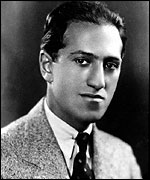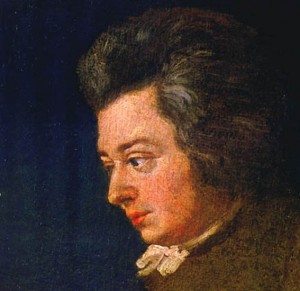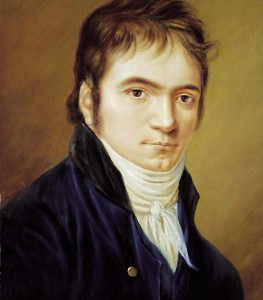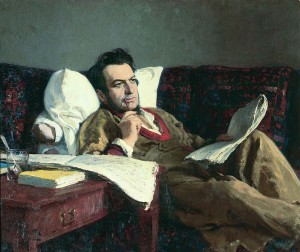List #2 in my Top 10 Top 10 lists game. Today, we look at the composers whose music inspired the musicians who came after them. I’d like to note that, in general, this is something that is totally out of a composer’s control – how can they possibly know if their musical language will be absorbed by anyone following them? [The big exception is people like Shönberg who were also significant teachers and disseminators.] So, I’m mostly trying to judge a simple historical fact here, not a composer’s talent or skill in “being influential”.
1. Guillaume de Machaut (1300 – 1377)

I realize it’s sort of obnoxious to start my list with someone who is only slightly older than music itself, and whose name is only vaguely familiar to the most astute of Early Music History Review students, but isn’t being sort of obnoxious one of the tenets of good blogging?
Guillaume really does deserve pride of place here for a lot of reasons – basically, he influenced a century and a half of musicians after him, something that very few other people have done. He popularized the use of four voices in mass settings, he added complexity to popular song forms, and he was also an accomplished poet. His intense vanity compelled him to publish his “collected works” in several volumes at the end of his life, something noone else had ever done and something that added considerably to the idea of music publishing and dissemination, not to mention scholarship.
Guillaume’s music sounded like this:
(Messe de Notre Dame, Hilliard Ensemble)
Influenced: Basically every 14th, 15th, and 16th century composer right up through Josquin and Vittoria. In fact he’s so influential, that some crazy person let loose on the grounds of Deutsche Grammaphon’s corporate headquarters even released a CD of Machaut remixes (including one by Brad Mehldau).
2. Johann Sebastian Bach (1685 – 1750)

Time to break out the big guns, boys – Johann’s in town. Bach’s name will appear on a good many of these lists, because he did a good many things. Even though he was beyond everyone in his own time period, he was considered old-fashioned. Ever the musician’s musician, he continued to be revered by composers and scholars even when his public image languished.
Influenced: His sons (JC, CPE, and the rest of his alphabetic brood), Haydn, Mozart, Beethoven, Schumann, Mendelssohn, Chopin, Brahms, Hindemith, and probably everyone that ever wrote two lines of counterpoint.
And he very definitely influenced Mahler. From deep in the bowels of the “Resurrection” Symphony:
3. George Gershwin (1898 – 1937)

In his short lifespan, George Gershwin wrote popular tunes that were irresistible to broadway, classical, and jazz musicians alike. Jazz musicians in particular latched on to his melodies and practically invented the idea of “standards” around them.
Meanwhile, he influenced several generations of popular classical composers (especially Lenny Bernstein) to try out jazzier idioms in the concert hall. I don’t think any single person is more responsible for the state of popular music worldwide than George Gershwin.
Here’s a little tour through 20th c. popular music history via Gershwin’s “Summertime”:
Influenced: Bernstein, Sondheim, Ravel, Richard Rodgers, Cole Porter, Ferde Grofe, Duke Ellington, Billy Strayhorn, every jazz musician who ever soloed over “Rhythm Changes”, every jazz composer who ever wrote a new tune over “Rhythm Changes”, every pop composer up to the present time who ever stole the descending bass line pattern from “I got Rhythm” (otherwise known as “Rhythm Changes”), at least.
4. (Franz) Joseph Haydn (1732 – 1809)
Papa was on our first list because he was a musical ground-breaker, but he appears on today’s because all his innovations were taken up by other people.
Influenced: Mozart, Beethoven, Brahms, Prokofiev, Ravel, and literally anyone who ever wrote a symphony or a string quartet.
5. Wolfgang Amad̩ Mozart (1754 Р1792)

Master of every domain, including opera, chamber music, symphony, and concerto, Mozart cast a wide net over his successors. Not surprisingly, opera composers down the ages worshiped him – Rossini was even dubbed “The Little Mozart” because of his affinity for the composer.
Tchaikovsky, however, was probably his most ardent admirer. Tchaikovsky’s opera The Queen of Spades is totally saturated with Mozart, but I don’t even know if Mozart could have written as Mozartean a number as this:
(“Moi milenki druzhok”, Gergiev)
Influenced: Tchaikovsky, Rossini, Schubert, Schumann, Haydn, Beethoven, Stravinsky, Rachmaninoff.
6. Arnold Sch̦nberg (1874 Р1951)
This poor man is so maligned for having opened the Pandora’s box of 20th century modernism in music. And with good reason. Starting with his close circle of pupils in Vienna, everyone just had to compose using his various systems. The real hook was dodecaphony, Schönberg’s principal for organizing the 12 pitches into previously unthought-of combinations. The 12-tone technique spawned an even more mathematically rigorous offspring: serialism.
There’s no point in judging whether or not this was a good thing – it simply is what happened.
Influenced (for better or for worse): Berg, Webern, Boulez, Nono, Messiaen, Stravinsky, Stockhausen, Eisler, Babbitt, Sessions, Wolpe, and leagues of other composers who wrote even uglier music.
7. Ludwig van Beethoven (1770 – 1827)

Beethoven’s an interesting case – sometimes he even influenced people not to compose. That was the case with Brahms who couldn’t get it up to write a symphony while Beethoven’s shadow was still in the room. More than any technical specific procedures, I think Beethoven’s biggest influence was in the philosophical scope of music – would Mahler ever have been able to compose the “Resurrection” symphony without Beethoven’s “Ode to Joy”?
Influenced: Berlioz, Schumann, Brahms, Bruckner, Ravel (I think), Bartok, Mahler, anyone who put a chorus in a symphony, anyone who ever thought music could literally change the world.
8. Richard Wagner (1813-1883)

Few composers had such a devoted cult in their own lifetime (not to mention after). Wagner’s innovations were far reaching, and spread like wildfire. Others had used themes to represent characters and objects before, but Wagner’s organized use of leitmotifs became a principle followed by several generations of composers. He also influenced a number of non-compositional disciplines: conducting, dramatic staging, architecture, and, unfortunately, philosophy.
Influenced: Mahler, Strauss, Zemlinsky, Schoenberg, Webern, Berg, Franck, Sibelius, Puccini, Rachmaninoff, Dvorak, Elgar, Max Steiner, Karl Goldmark, Howard Shore, and anyone who wanted to convey a dramatic impulse through music.
9. Mikhail Glinka (1804 – 1857)

I know hardly anything about this man or his music, but what I do know is that any time you read anything about a Russian composer who came after him, those guys are always talking about how big an influence he was. So, it’s a slightly “provacative” inclusion on this list (and yes, I do expect wide-spread violence as a result of it) but maybe it will induce someone – anyone – to give his music a first listen and a fair shake.
Tchaikovsky adapted this theme from Glinka’s “Ivan Susanin” for the head motif of his 5th symphony:
Influenced: Tchaikovsky, Borodin, Mussorgsky, Rimsky-Korsakov, Glazunov, Rachmaninoff, Shostakovich
10. Claudio Monteverdi (1567 – 1643)
In the first list, I quoted the eminent music scholar David Ewen in noting Monteverdi’s profound accomplishment. The fact that we still have people writing operas today is largely due to him CM, not to mention the fact that he more or less invented the idea of instrumental tone painting.
Influenced: Schütz, Cavalli, Lully, Scarlatti, Rameau, Vivaldi, and essentially everyone who ever wrote an opera.
Discuss
Rules of the game: either submit your own top 10 list, or submit one or more alternates to my list in the comments section. If you choose the latter option, note that you must replace someone on my list, and make sure you tell us who it’s going to be.
Or just use this space to chat amongst yourselves about various Influential composers. “Composers”, for our purposes, means people who write music using any Western notation (it could be of their own devising). There is no limit as to genre or time period, so I’d be very interested to see some bizarre responses (think: Anton Reicha).
So, just for fun, I decided to make my own list in anticipation of the great many influences yours might have on my impressionable noodle. Off we go:
1. Wagner, for without whom none of the twentieth century would have happened.
2. Schoenberg, for without whom none of the second half of the twentieth century would have happened.
3. Beethoven. That whole composer as hero thing. On top of your reasons, I think the concept of a composer who was just off on his own in a Viennese apartment spitting out incredibly singular statements was a major revolution in the conception of the “composer”. Although, Mozart sort of started that trend earlier. But really Heinrich Isaac was the first freelance composer not tied to a court or the church…
4. Palestrina. I think more than Bach (gasp!), this is the guy we need to blame for counterpoint. Granted, Bach took us pretty far afield from such pristine origins, but the philosophy of 16th century counterpoint, as framed mostly by Fux through his interpretation of Palestrina, persists through the current day.
5. Christoph Willibald Gluck. Perhaps even more so than Mozart (another gasp!), this guy had a profound influence on later opera composers. I mean, people were obsessed with him throughout the 1800s, which is pretty impressive considering there was often talk of Mozart sounding old. I think it’s really too bad we don’t hear, like, any of his music ever.
6. CPE Bach. Indeed. Learned a lot from his daddy, but if you try to figure out when “baroque” turned to “classical,” (which is sort of an idiotic endeavor), you land on this guy. I feel like he’s the first composer to embrace in a really deep way the ideals of the enlightnment, which consequently went a long way and really allowed for the development of romanticism in both music and other arts.
7./8. The Reich/Glass dyad. Maybe it’s a little naive, but we usually talk about the history of music as following a pretty linear and consistent path…until you get to about 1965. Obviously this ignores a lot (like, oh, I dunno, Jazz (snaps for Gershwin!)), but it is safe to say that when we talk about music in the latter half of the 20th century, things get complicated quickly and I like to attribute it to the emergence of a COMPLETELY different take on how composers of Western art music should prioritize various musical parameters. Needless to say, everyone and their mother who writes music today owes something to one of these two.
9. Nadia Boulanger, though not really spoken of so much as a composer, I think needs mention simply by virtue of how many composers she taught! AND! How many of her students are proud to admit the positive influence she had on them! Copland, Glass, Elliott Carter…it’s endless and fascinating. Such disparate responses to her teaching, but something certainly took. There’s a dissertation in there, I’m sure.
10. Liszt, for similar reasons to Nadia. But also, I feel like we can trace the modern requirements of virtuosity back to him. There were plenty of earlier virtuoso performers, but the fact that he put that stuff on paper not only expanded the limits of the piano, but also what a composer could demand of any instrument. Ergo, Berio.
So there it is! I like this game and I found your list fascinating. I was especially glad to see Gershwin up there…I just wish we had more slots in the lists! It feels ludicrous to not mention people like Miles Davis, or Ellington, or Coltrane, or Mingus, all of whom have not only had a profound effect on Jazz, but certainly did on classical music. Ligeti thought so, too! And then there’s the Beatles…
Gabe,
I like everything about your list. A few questions and comments:
What about Terry Riley? Would you think of including him on either this list? How about the “most Innovative” list?
Jazz and other popular musics are a really tricky thing on all of these lists, but especially this one. And your inclusion of Nadia Boulanger brings up a similar point. Nadia and Mingus may technically have been composers in our sense (writers-down of music), but did they achieve their greatest influence via the written note? Is that even what the list is about?
I didn’t specify, and I like your creative streak in interpreting the guidelines as you did. But almost all the really influential jazz musicians innovated and influenced via their instruments. I’d say the big exceptions are Duke Ellington and Billy Strayhorn. Plus wasn’t there a president of like Poland or Czechoslovakia who was a composer? That would be an influential composer!
Did The Beatles write out their music? I limited this whole game to writers of music just so we wouldn’t have to do deal with every single music and musician everywhere, and go even crazier. Neither of us needs that.
First of all, I agree that Glinka deserves his seat here with the big dogs. To see why, try and find one lick of Russian classical music written before 1820…
While Schoenberg was perhaps more innovative, I believe it was Webern who exerted a more profound influence on the composers you’ve listed above as being indebted to Schoenberg (with the exception of Berg and Stravinsky). Despite Arnold’s decomposition (!) of traditional harmony, there lurks within his music vestigial organs (!) of the old school. It was Webern who truly bore that unsavory torch of progress later to be taken up by the likes of Boulez and Nono.
In: Webern
Out: Schoenberg
Serialism never would have enjoyed the primacy it attained in the twentieth century if not for Webern. Initially the twelve-tone technique was malleable – witness the diversity of its treatments by Vienna2.0! But Webern’s application exemplified total control and precise manipulation. Most of the composers named above as Schoenberg’s descendants demonstrated a similarly neurotic insistence on careful pre-calculation of parameters. Even though Webern’s huge debt to Schoenberg is obvious, I think his amplification of the technique’s most meticulous facet is really to blame for serialism’s virulence.
Colin and Mike –
I like your chutzpah (!) And I think you both make a remarkably good case for Webern. The Webern question sort of brings up another thing that’s very tricky about a list like this and about talking about influence in general. Who do we count? The granddaddy, or just the father? Gabe’s opinion is that without Schoenberg none of the second half of the twentieth century would have happened. Let’s all agree to forget about the details and just accept the general truth of that statement for a bit. Without Schoenberg, would there have been Webern? Without dodecaphony, would there have been serialism?
I would argue No. To me, the big innovation and the big influence in thinking about music was in thinking about the mathematical structures in music FIRST, and the sonic world as a consequence of that. I’m not saying that dodecaphonic composers didn’t think about the sounds they were making (although some of them expressly DIDN’T). In that way, I think it’s only natural that other composers would expand on that basic concept to mathematicize other (and eventually, all) parameters in music.
Without Anthony Tommasini’s “Top 10 Greatest Composers” list, would there be Will White’s “Top 10 Top 10 Lists”?
Also, just one more point: I can’t imagine there’s any way to crunch the numbers on this, but I would guess that way more composers adopted dodecaphony than adopted the full serial system.
It seems Colin and I had just shared momentary metaphysical oneness of mind.
Mmmm debate! I love Terry Riley. I love La Monte Young. But try as I might, I always have a hard time convincing myself that “In C” or “The Well Tuned Piano” really are the pieces that did the deed. I suppose part of this might be a function of my own ignorance; I, alas, didn’t make it to Yoko Ono’s loft any time during the early ’60s and thus cannot really gauge for myself whose mojo was fueling the zeitgeist (now there’s a hipster sentence). What I do feel confident about, though, is the notion that a random sampling of working composers today will cite at least one of “Drumming,” “Music for 18 Musicians,” “Einstein on the Beach,” or, though they’re a bit later, “Glassworks” or “Koyaanisqatsi” as having been important for them…and maybe not so much “In C.”
The issue of writing out is certainly an issue. Honestly, I don’t know that I have a good response simply because it’s difficult to compare the modes of transmission that exist in the classical world vs. Jazz or anything else. We pass around scores, listen to single performances on random concerts, and fall back on a rich and elaborate history while the story of Jazz is transmitted through recordings and long stints at clubs or constant touring. And, as bootlegs, the Anthology, etc. have shown, even if the Beatles didn’t so much write things down, their extensive studio processes absolutely qualify as compositional process in action. Different styles have different priorities and I tend to feel like it’s important to both keep that in mind and allow it to expand the purview of one’s endeavors. Not that I’m criticizing or anything; quite the contrary. It just really is tough to make a VERY short list of influential writers of music when, even with constraints, the range of our own priorities can be vast.
I guess maybe Nadia could go…but then again, I don’t know that she’d have been as good a teacher if she wasn’t really an excellent composer. I guess I was stretching the rules with this one, since it wasn’t actually her music that was necessarily influential, but still. She was a bad-ass.
In re Webern: yeah, the dude’s important, but I stand by my original point plus the true fact that twelve-tone music has done quite a bit without getting overly controlled (thanks, Will). One of my teachers once said that technique does not dictate aesthetic and I think this is really the crux of the issue. Yes: Webern’s technical prowess was certainly a big step, but it’s a straight line from Arnold to Dallapiccola to Donald Martino, who came up with some of the most intricate serial complexes on Earth. And, when the time came, Boulez’s article calling for stricter control in the compositional process was not called “Webern is Dead.” Granted, that last one is maybe kind of a cheap argument, but it helps make a point. The idea of serialism, or simply free atonality, as conceptualized and executed by dear uncle Arnold is really the thing that became so virulent.
And I believe you’re thinking of Paderewsky, who was Prime Minister of Poland and wrote a symphony with parts for three Sarrusophones. Influence, indeed.
actually, i guess it’s not really a straight line from Schoenberg to Dallapiccola at all. gabe fail. but still: where would any of us be if Arny didn’t order his pitches?
In the spirit of all great Internet discussion.
YOU’RE WRONG!
(oh, excuse me… that’s supposed to read: YOUR WRONG.)
1. Debussy
2. Lennon/McCartney
3. Monteverdi
4. Brahms
5. Beethoven
6. Stockhausen
7. Webern
8. Xenakis
9. Daft Punk
10. Rossini